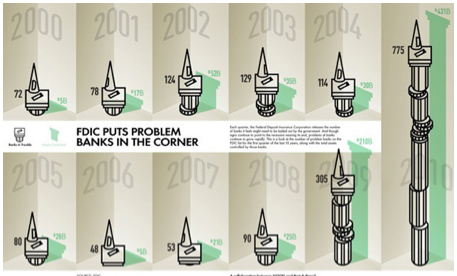 When you want the cold, hard facts about a stock or a market, you look for a person like Steven Goldman. He’s spent the last 25 years as a chief market strategist for Weeden & Co., which basically means he does the really hard math so you don’t have to. (Weeden is a brokerage and research firm serving mostly institutional investors.) Steven looked up from his computer long enough to share an inside look at the work that keeps the market moving.
When you want the cold, hard facts about a stock or a market, you look for a person like Steven Goldman. He’s spent the last 25 years as a chief market strategist for Weeden & Co., which basically means he does the really hard math so you don’t have to. (Weeden is a brokerage and research firm serving mostly institutional investors.) Steven looked up from his computer long enough to share an inside look at the work that keeps the market moving.
TILE: So how did you end up where you are today?
Steven: In the midst of heading to business school in 1979, I was offered a job at a regional brokerage. I decided to enroll in both. I was excited about working for a smaller equity brokerage firm, which would allow me greater visibility along with access to most of the seasoned employees. My initial interest was to focus on emerging and undiscovered stocks. That year and over the next few years, stock prices moved symmetrically up 30%, down 30% etc… I noticed that the stocks that I had selected always moved with the direction of the stock market. In reviewing historical patterns, I found that these symmetrical movements were not confined to three years but to 17 years (from 1966 to 1982). So my next endeavor was to not focus on undiscovered or emerging stocks, but to understand what measures can be applied to predict stock prices. My graduate thesis was called “A Non Random Walk Down Wall Street.” In 1981, I purchased an Apple II computer and I haven’t stopped since (though I have since upgraded my computer).
TILE: You’ve said that part of your job is “getting a feel” for where stock prices will go in the next few months. How much of your job is calculation and how much is intuition?
Steven: Well, I have developed over a hundred indicators, which can be broken down into four basic areas:
Market Structure – Is the market strengthening or weakening?
Sentiment – Are traders too bullish or too bearish? This is used to determine if stock prices will reverse in the short term.
Valuations – Are stock prices considered fully valued – which may start to restrict the market gains – or are valuations reasonably priced?
Interest Rates – This indicator has been less significant in the past few years. It basically involves watching the direction of interest rates to determine when a rise in interest rates or the decline in rates are reaching inflection levels with regards to stock prices. Interest rates spread between BAA rates (lower quality) vs AAA rates (higher quality) have been helpful to look at in the past few years. Despite all these standard “tools” and models, I will still synthesize all relevant factors to develop a stock market forecast over both short-term and intermediate time frames.
TILE: What advice would you give to a college student considering careers in the financial sector?
Steven: Wall Street offers a myriad of different jobs. Though my focus is exclusively in equity, larger firms have numerous specialists and strategists in many different areas such as distressed debt, interest rates, foreign currencies, convertible bonds etc…
Larger firms will have extensive trading programs and upon the completion of the programs, they will help you decide in which area you would be most valuable to the organization.
Other important things to consider are the process of self discovery… how excited or passionate would you be working in this environment… Can you handle the emotional highs and lows? How do you handle being wrong and how resilient will you be afterwards? Are you interested in math, the gamesmanship involved? Do you like to toy around with computers and complicated games like chess? A minor in math, computer programming and economics would be helpful in terms of identifying your interests and preparing you for a career in finance.
>> TILE brings you exclusive opinions, explanations, and interviews from experts in every industry. To read more, click on Ask the Experts in the TILE Library.
Have a burning question or an expert you’d like to see interviewed? Just Ask TILE!

 When you want the cold, hard facts about a stock or a market, you look for a person like Steven Goldman. He’s spent the last 25 years as a chief market strategist for Weeden & Co., which basically means he does the really hard math so you don’t have to. (
When you want the cold, hard facts about a stock or a market, you look for a person like Steven Goldman. He’s spent the last 25 years as a chief market strategist for Weeden & Co., which basically means he does the really hard math so you don’t have to. (